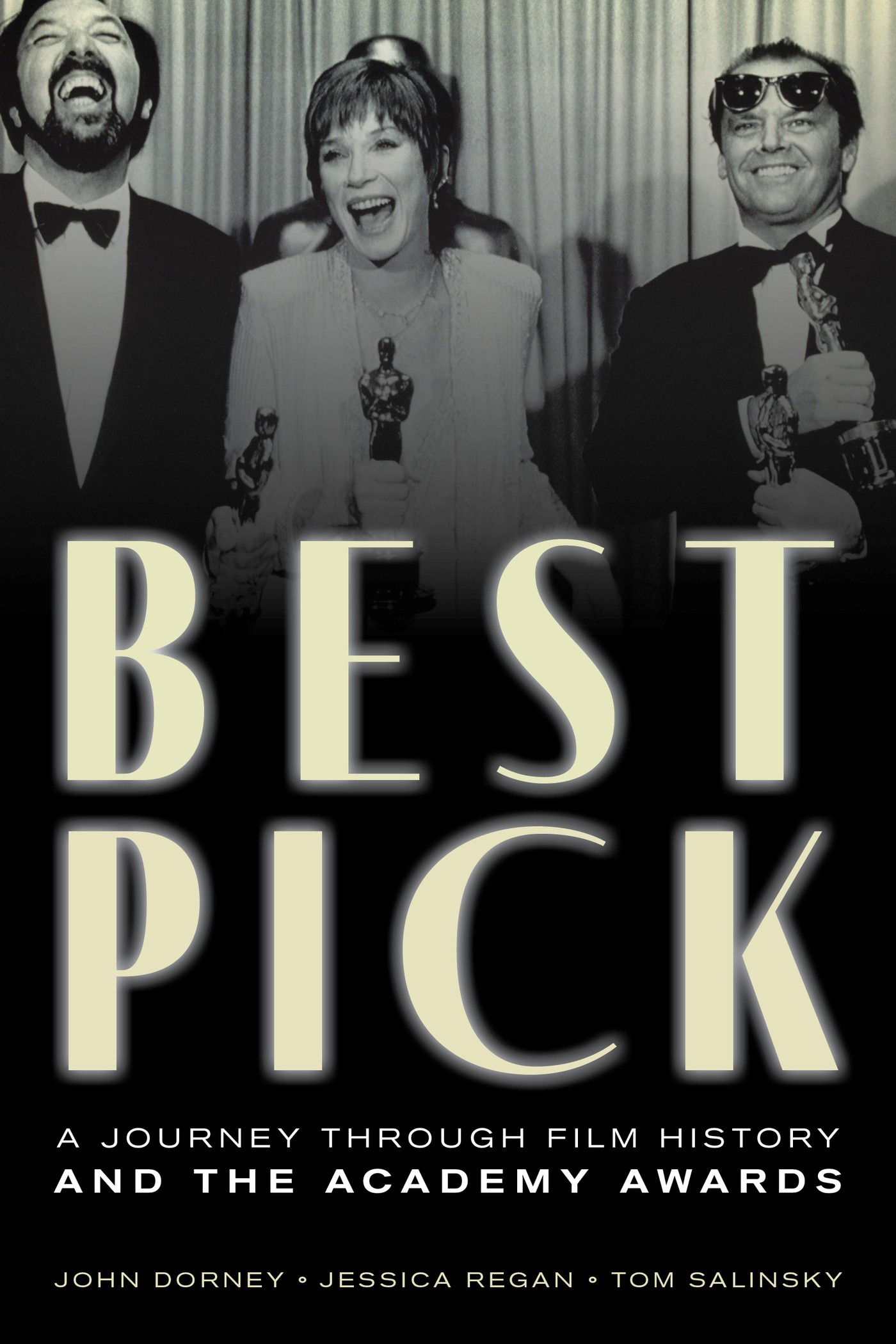Best Pick
A Journey through Film History
and the Academy Awards
John Dorney, Jessica Regan,
and Tom Salinsky
ROWMAN & LITTLEFIELD
Lanham Boulder New York London
Published by Rowman & Littlefield
An imprint of The Rowman & Littlefield Publishing Group, Inc.
4501 Forbes Boulevard, Suite 200, Lanham, Maryland 20706
www.rowman.com
86-90 Paul Street, London EC2A 4NE, United Kingdom
Copyright 2022 by John Dorney, Jessica Regan, and Tom Salinsky
All rights reserved. No part of this book may be reproduced in any form or by any electronic or mechanical means, including information storage and retrieval systems, without written permission from the publisher, except by a reviewer who may quote passages in a review.
British Library Cataloguing in Publication Information Available
Library of Congress Cataloging-in-Publication Data Available
Names: Dorney, John, 1976- author. | Regan, Jessica, 1982- author. | Salinsky, Tom, author.
Title: Best pick : a journey through film history and the Academy Awards / John Dorney, Jessica Regan, Tom Salinsky.
Description: Lanham : Rowman & Littlefield, [2022] | Includes index. | Summary: A fascinating history of motion pictures through the lens of the Academy Awards, Best Pick provides a decade-by-decade look at the Oscars by examining the Best Picture winners, highest-grossing films, and biggest misses alongside a discussion of the trends, innovations, and stories that defined the decadeProvided by publisher.
Identifiers: LCCN 2021033738 (print) | LCCN 2021033739 (ebook) | ISBN 9781538163108 (cloth) | ISBN 9781538163115 (epub)
Subjects: LCSH: Academy Awards (Motion pictures)History. | Motion picturesAwardsUnited StatesHistory.
Classification: LCC PN1993.92 .D67 2022 (print) | LCC PN1993.92 (ebook) | DDC 791.43079dc23
LC record available at https://lccn.loc.gov/2021033738
LC ebook record available at https://lccn.loc.gov/2021033739
 TM The paper used in this publication meets the minimum requirements of American National Standard for Information Sciences Permanence of Paper for Printed Library Materials, ANSI/NISO Z39.48-1992.
TM The paper used in this publication meets the minimum requirements of American National Standard for Information Sciences Permanence of Paper for Printed Library Materials, ANSI/NISO Z39.48-1992.
John Dorney: For Mum and Dad for encouraging a love of story
and letting me see all the films I shouldnt have.
Jessica Regan: For my parents, Maria and Sen, who gave me
everything. You are in every line I write. And for the late Kevin
Boyle, brother of Fiona, who gave his little sister and her pals
access to his VHS library of wonders.
We thank you, and we miss you.
Tom Salinsky: For all the people who have introduced me to
films I would otherwise never have watched: my parents,
Deborah Frances-White, Alex MacLaren, Jamie de Courcey,
Robert Khan, and Jason Smith, among many others. And
Joe Adamson, Alexander Walker, and David Thomsononly
three out of dozenswho showed me that writing about
films can be as much of an art as creating them.
Foreword
Helen OHara
The Academy Awards often (some would say usually) get the Best Picture winner wrong. Anyone whos ever seen Driving Miss Daisy can tell you that. But how and why they get it wrong has changed over time, and one of the things this book does brilliantly is to explain that. Jessica, John, and Tom have boiled down the years of research that went into their expert podcast and produced an entertaining guide to the whole awards picture, and the social and cinematic context that birthed it.
This is therefore a fascinating snapshot of what Hollywood considers good filmmaking. In the early days, with a very small voting body drawn solely from among the most powerful people in the industry, it clearly reflected the values of Tinseltown itself. Now, with a more diverse votership in terms of age, race, sex, and nationality, it shows an awards body that is trying to become more pluralistic and more representative of filmmaking as a wholealbeit still, largely, American Anglophone filmmaking.
Unless youre Martin Scorsese and have already seen everything, youre also going to come out of this with a list of films to seek out so you can catch up with Tom, Jessica, and John. Thanks to them youll know which Oscar winners to prioritise and which you can maybe skip entirely. Theyve done the hard work of assessing the worthy winners and embarrassing misses so you dont have to sit through all the Oscar winning films of the 1980s, and for that alone these heroes deserve our undying respect. They even watched Crash. On purpose.
The sheer depth of knowledge, passion and research that the Best Pick team have means that youre going to come out the other side armed with a better understanding of film historyand, not for nothing, the knowledge to win any pub quiz going.
I was delighted to guest on the podcast (1942, Mrs Miniver) not just because it was a pleasure to talk to the team but because I learned so much from their analysis over the length of the shows run. The Oscars may get it wrong, but this trio is generally right on the money. How do we put them in charge of the little gold guys?
Helen OHara is a prominent film critic and editor at large at Empire Magazine, Sky Oscars commentator and author of Women vs Hollywood: The Fall and Rise of Women in Film.
Introduction
What do the Oscars mean to you? In the 1930s and 1940s, the ceremony itself was a banquet dinner in a hotel. In the 1950s, it became a lavish televised production. By the 1960s, it was starting to look dated. And yet, that doesnt even get us halfway through its life. Today, many people see it as an irrelevance, a fossil of a bygone age, mired in prejudice, unable to find a tone that connects with a younger audience, and always picking the wrong movies. Respectfully, we disagree.
Around the world, especially the English-speaking world, movies mean Hollywood, and Hollywood means Oscars. If you love film, then the Oscars still matter. Winning an Oscar can transform a career. And the upside of the Oscars reserving its highest awards for films that never even dent the top twenty at the box office is that there are other rewards apart from the purely financial, which help filmmakers like Barry Jenkins, Ava DuVernay, Alfonso Cuarn, Yorgos Lanthimos, Greta Gerwig, and Steve McQueen get their films made. Even if that same Academy of Motion Picture Arts and Sciences sometimes gives its top prize to Green Book.
So, we dont pretend that the ninety-two Best Picture winners are the ninety-two best films ever made. In fact, we only sometimes find that the Academy has picked what we think is the best film of the year. But that list of ninety-two films is a finite list that permits no arguments. And thats what inspired us.
The three of us had always been keen Oscar watchers. For a number of consecutive Marches, wed gathered around the television together near midnight with bowls of popcorn and glasses of wine (followed several hours later by mugs of coffee) to watch lavish production numbers, awkward comedy bits, parades of anonymous technicians winning for sound mixing or visual effects, stalwart campaigners denied their prize yet again, first-timers reduced to tears, people unthanked, names mispronounced, and finallyat the end of the nighta new film added to this very specific list.
Gradually, the idea took hold. Ninety-two Best Picture winners. Ninety-two podcast episodes. For each instalment, we researched what happened at that years awards, looked more widely at the world of film, dug into the making of the winnerand sometimes took detours into other films, filmmakers, trends, and genres. Then we watched the film together and gave our verdictdid the Academy (in our opinion) get it right?
Next page
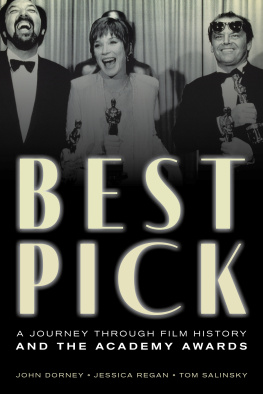
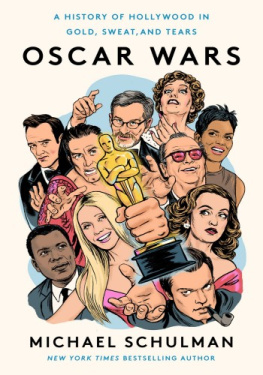
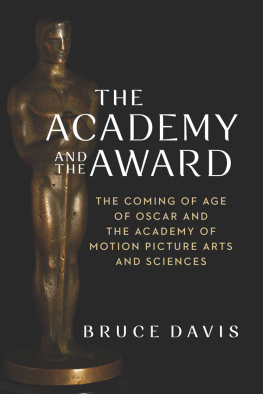

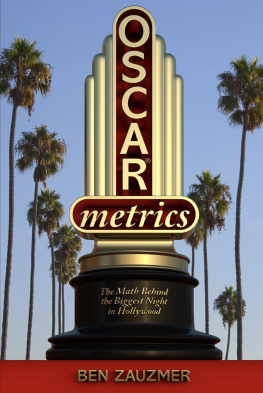
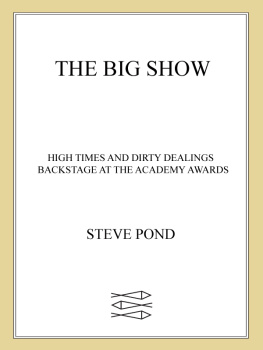
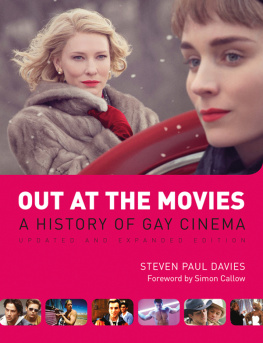

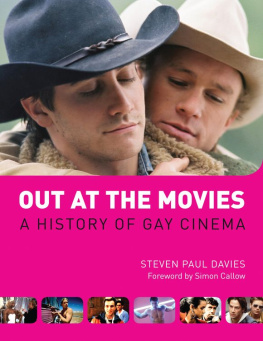
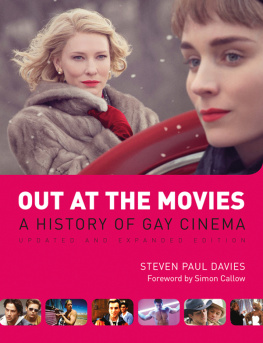
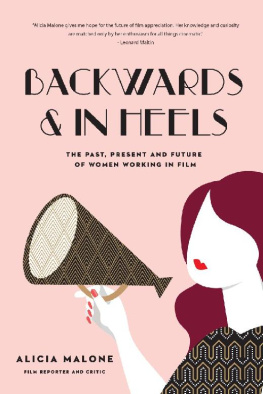
 TM The paper used in this publication meets the minimum requirements of American National Standard for Information Sciences Permanence of Paper for Printed Library Materials, ANSI/NISO Z39.48-1992.
TM The paper used in this publication meets the minimum requirements of American National Standard for Information Sciences Permanence of Paper for Printed Library Materials, ANSI/NISO Z39.48-1992.